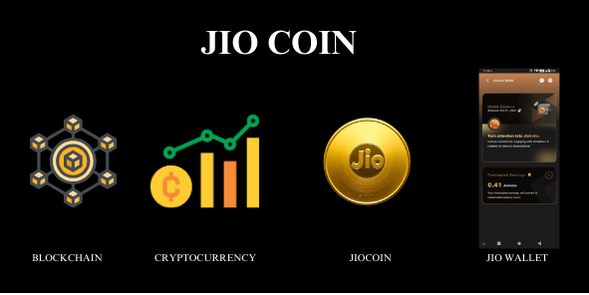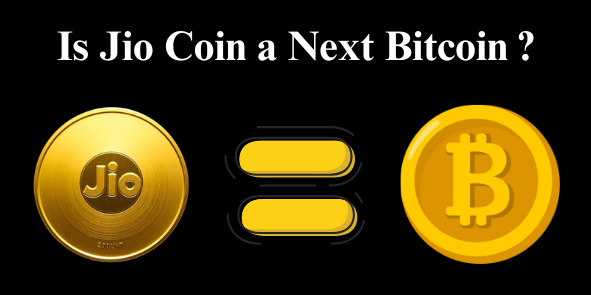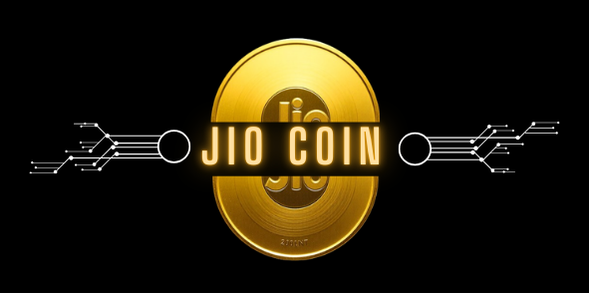Jio Coin: India's Digital Revolution in Cryptocurrency
In a world rapidly shifting towards digitization, India is no exception. The rise of cryptocurrencies globally has prompted many Indian companies to explore this futuristic space. One name that has always been synonymous with revolution in India is Reliance Jio. After disrupting the telecom, broadband, and retail sectors, the company is now rumored to have its eyes set on cryptocurrency with the introduction of Jio Coin. While there has been a lot of speculation and anticipation, let’s delve into what Jio Coin could mean for the Indian market and its potential to shape the future.
What is Jio Coin?
Jio Coin is rumored to be Reliance Jio's attempt to step into the cryptocurrency space. While there hasn’t been an official announcement yet, reports suggest that the initiative may be spearheaded by Akash Ambani, who has expressed a keen interest in blockchain technology.
The idea behind Jio Coin is to leverage blockchain to create a digital currency that aligns with India’s evolving financial ecosystem. It is expected to focus on simplifying digital transactions, creating blockchain-based applications, and integrating cryptocurrency into everyday life for the masses.
Key Features and Potential of Jio Coin

-
Blockchain-Based
Blockchain technology is at the heart of any cryptocurrency. Jio Coin is expected to run on a secure and efficient blockchain network, ensuring transparency, reliability, and security in transactions. -
Integration with Jio Ecosystem
Reliance Jio already has a massive ecosystem of users across telecom, broadband, retail, and digital platforms. Jio Coin could potentially integrate with services like JioMart, MyJio App, and other platforms, creating a seamless payment and rewards system for users. -
Promoting Digital Payments in India
With the government pushing for digital transactions under its Digital India initiative, Jio Coin could act as a catalyst for mass adoption of cryptocurrencies, especially in a country where financial inclusion is still a challenge. -
Affordability and Accessibility
Reliance Jio has a track record of making its services affordable for everyone. If the same pricing philosophy is applied to Jio Coin, it could become an entry point for millions of Indians into the cryptocurrency space. -
Smart Contract Applications
Jio Coin could explore blockchain applications beyond currency. Smart contracts, supply chain tracking, and digital identity verification are just a few areas where it could find utility.
Challenges Jio Coin Might Face
While the concept of Jio Coin is exciting, it also comes with challenges:
-
Regulatory Uncertainty: Cryptocurrency regulations in India have been a gray area. The government is working on creating a legal framework, but the lack of clarity may slow down Jio Coin’s launch and adoption.
-
Trust and Awareness: Despite growing interest, many Indians are still skeptical of cryptocurrencies. Educating users and building trust will be key for Jio Coin’s success.
-
Global Competition: Established cryptocurrencies like Bitcoin and Ethereum already dominate the market. Jio Coin will need unique features to stand out.
-
Security Concerns: Cybersecurity will be critical to prevent hacks and protect users' funds.
How Jio Coin Could Shape India's Financial Future
If executed well, Jio Coin could become a significant player in India’s digital revolution. Here’s how:
-
Financial Inclusion: By offering an affordable and accessible cryptocurrency, Jio Coin could bring millions of unbanked individuals into the digital economy.
-
Economic Growth: Encouraging blockchain adoption could lead to new businesses and job opportunities in tech and finance.
-
Pioneering India’s Crypto Space: Jio Coin could pave the way for other Indian companies to enter the cryptocurrency market, fostering innovation and competition.

Can Jio Coin Be the Next Bitcoin?
The cryptocurrency world has seen its fair share of disruptors, but no name resonates more than Bitcoin, the original cryptocurrency that paved the way for a decentralized digital economy. With rumors about Jio Coin, Reliance Jio's potential entry into the cryptocurrency space, the big question is: Can Jio Coin be the next Bitcoin? While it’s ambitious to compare any cryptocurrency to Bitcoin, the idea of Jio Coin holds significant promise, especially in the context of India’s growing digital economy. Let’s dive into this question and evaluate the possibilities.
Understanding the Bitcoin Phenomenon
To understand whether Jio Coin can emulate Bitcoin’s success, we first need to grasp what made Bitcoin revolutionary:
-
First-Mover Advantage
Bitcoin was the first cryptocurrency to introduce the concept of blockchain technology, creating a decentralized, peer-to-peer system for transferring value. -
Limited Supply
Bitcoin’s supply is capped at 21 million coins, creating a scarcity that has driven up its value as demand grew. -
Global Adoption
Bitcoin isn’t tied to any specific country or organization, making it a truly global asset with widespread adoption. -
Store of Value
Over time, Bitcoin has transitioned from being a digital currency to a “digital gold” — a store of value for investors.
While Bitcoin’s rise was unique and rooted in its timing, Jio Coin could carve its own path by addressing specific opportunities in the Indian and global markets.
Jio Coin vs. Bitcoin: Key Differences
1. Purpose and Target Audience
- Bitcoin: A decentralized currency designed for global, borderless transactions. Its appeal lies in its independence from governments or corporations.
- Jio Coin: If launched, it’s likely to focus on Indian users and integrate deeply with Reliance Jio’s ecosystem. Jio Coin could be less about decentralization and more about enabling fast, affordable digital transactions for India’s growing digital economy.
2. Accessibility
- Bitcoin is often criticized for being expensive and complicated for beginners.
- Jio Coin has the potential to be an affordable and user-friendly cryptocurrency, leveraging Reliance Jio’s existing infrastructure to reach rural and urban India alike.
3. Use Cases
- Bitcoin’s primary use case is as a store of value or investment.
- Jio Coin could focus on real-world applications, such as payments for goods and services, blockchain-based supply chain tracking, and smart contracts within India’s rapidly growing tech ecosystem.
4. Regulatory Backing
- Bitcoin operates outside traditional regulatory systems, often creating concerns for governments.
- Jio Coin, backed by Reliance Jio, would likely work within India’s regulatory framework, offering greater legitimacy and trust for users and investors.
Why Jio Coin Has the Potential to Succeed
-
Massive User Base
Reliance Jio’s telecom services already have over 450 million users in India. If even a fraction of this user base adopts Jio Coin, it could achieve mass adoption faster than Bitcoin did in its early years. -
Integration with the Jio Ecosystem
Jio Coin could become a key currency for transactions within Jio’s ecosystem, including JioMart, JioCinema, JioFiber, and more. This would give it a practical use case from day one, unlike Bitcoin, which took years to find widespread applications. -
Localized Solutions for India
India is a unique market with a growing middle class and increasing smartphone penetration. Jio Coin could be tailored for India’s specific needs, such as microtransactions, rural accessibility, and integration with government initiatives like Digital India. -
Trust Factor
Bitcoin faced skepticism in its early days as it was created by an unknown entity (Satoshi Nakamoto). In contrast, Jio Coin would carry the credibility of Reliance Industries, one of India’s largest and most trusted conglomerates. -
Blockchain Innovations
Beyond being a currency, Jio Coin could lead blockchain adoption in India. From supply chain optimization to digital identity management, Reliance could leverage blockchain to transform industries, adding intrinsic value to Jio Coin.
Challenges for Jio Coin
While the potential is immense, Jio Coin would face challenges:
-
Regulatory Uncertainty
India’s stance on cryptocurrencies is still evolving. A strong regulatory framework would be essential for Jio Coin’s success. -
Competition
Established players like Bitcoin and Ethereum dominate the global market, while Indian investors are already familiar with cryptos like Polygon (MATIC). Jio Coin would need unique features to stand out. -
Decentralization Concerns
Bitcoin’s appeal lies in its decentralized nature. If Jio Coin is centralized and controlled by Reliance, it may face criticism from crypto purists. -
Market Volatility
Like all cryptocurrencies, Jio Coin would be subject to market fluctuations, which could deter risk-averse investors.
Can Jio Coin Be the Next Bitcoin?
While Bitcoin is unique and irreplaceable as the pioneer of cryptocurrencies, Jio Coin doesn’t need to replicate Bitcoin’s trajectory to succeed. Instead, it can:
- Create its niche as India’s first major cryptocurrency, focusing on accessibility, usability, and integration with daily life.
- Drive mass adoption of blockchain technology in India, addressing real-world problems and boosting economic growth.
- Complement Bitcoin rather than compete with it, offering localized solutions while Bitcoin remains a global asset.
Jio Coin’s success would depend on its ability to solve problems unique to India while aligning with the country’s digital transformation goals.
Final Thoughts
Jio Coin might not become the next Bitcoin in terms of global dominance or valuation, but it has the potential to revolutionize cryptocurrency adoption in India. By leveraging Reliance Jio’s extensive reach and trust, Jio Coin could democratize access to digital currencies, making them a part of everyday life for millions of Indians.
For investors, Jio Coin represents an exciting opportunity to be part of a cryptocurrency that could redefine India’s financial landscape. It’s not about replacing Bitcoin—it’s about creating a unique revolution tailored for India’s future.
Disclaimer: This article is for informational purposes only and does not constitute financial advice. Please do your research and consult an expert before investing in cryptocurrencies.

